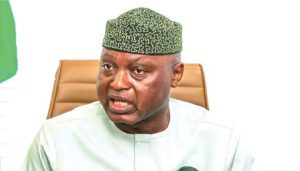
Tinubu’s economic reforms drive growth amid political risks – IMPI report
By Seun Ibiyemi
A new report by the Independent Media and Policy Initiative (IMPI) has commended President Bola Ahmed Tinubu’s economic reforms for driving record trade growth and increasing foreign investment but warns of significant political risks as the country adapts to sweeping policy changes.
According to IMPI’s analysis, Tinubu’s administration has pursued bold macroeconomic reforms, including the removal of fuel subsidies, harmonization of foreign exchange rates, and deregulation of key sectors.
These policies have boosted Nigeria’s total trade exports to $50.4 billion in 2024, the highest in recent years, while total trade volume surged to ₦138 trillion ($89.9 billion), a 106 per cent increase from 2023.
The report highlights a strong rebound in foreign direct investment (FDI), projected to reach $21 billion in 2024, with $17 billion flowing into the Nigerian National Petroleum Corporation Limited (NNPCL) alone.
Additionally, foreign exchange inflows into Nigeria rose by 41% year-on-year, totaling $79.8 billion in the first 10 months of 2024.
However, IMPI cautions that these reforms come at a significant political cost, as economic adjustments—particularly the naira’s 70 per cent depreciation to around ₦1,500/$1—have led to higher import costs and inflationary pressures.
Despite this, food prices have begun to decline, with food inflation dropping to 23.51 per cent in February 2025, down from 37.92 per cent a year earlier.
The agriculture sector remains a weak spot, growing at just 1.74 per cent in 2024, hindered by high input costs, climate challenges, and reduced government intervention following the suspension of the Anchor Borrowers’ Programme.
However, the ₦1.5 trillion recapitalization of the Bank of Agriculture (BOA) in the 2025 budget is expected to address some of these issues.
IMPI concluded that while Tinubu’s reforms are reshaping Nigeria’s economy for long-term growth, they require political resilience and sustained commitment to overcome resistance and short-term disruptions.
The report urges the administration to stay the course, citing historical precedents from reform-driven economies like Singapore and Rwanda.




